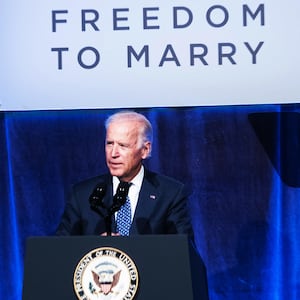In his first remarks to State Department staff since his inauguration, President Joe Biden on Thursday announced that he was issuing a presidential memorandum laying out new policies for America’s diplomats to promote and protect the rights of LGBTQ people around the world.
The announcement merges two of Biden’s longtime political passions—foreign policy and the fight for equality for lesbians, gays, bisexuals and transgender people—at a moment when the campaign for equality has been jolted back to life, after four years of attacks and the general bigotry of the Trump administration.
Biden, speaking to reporters at the State Department’s headquarters in Foggy Bottom on Thursday afternoon, said that the policies are intended “to further repair our moral leadership.”
“We’ll ensure diplomacy and foreign assistance are working to promote the rights of those individuals,” Biden said, “included by combatting criminalization, and protecting the LGBTQ refugees and asylum seekers.”
A senior administration official told The Daily Beast that the announcement is intended to be both “a powerful symbol” and an explicit instruction to those rebuilding the nation’s foreign policy that expanding LGBTQ rights abroad is the official stance of the United States government.
“There will be no ambiguity,” the official said. “This is not the word of one envoy or cabinet secretary. Biden wants this to be seen as the policy of the United States government. This administration prioritizes LGBTQ rights as human rights.”
The commitment to fighting for equality internationally comes at a time when LGBTQ rights rise to the top of Biden’s domestic agenda—a sharp contrast to the Trump administration’s focus on enacting discrimination, much of it focused on the trans community, as in the trans military ban which Biden lifted by executive order last week.
Democrats hold majorities in both chambers of Congress, the White House is now home to a longtime ally of queer communities, and passage of the Equality Act—the movement’s biggest goal since its victory in the battle for marriage equality five years ago—appears closer to reality than ever. With the major planks of the LGBTQ domestic agenda nearly complete, more advocates for equal rights and protection are looking beyond America’s borders, where the global push for equality for lesbians, gays, bisexuals and transgender people remains far from won.
There are many potential ways in which Biden’s memorandum could manifest into actual State Department policy, according to Aaron Morris, executive director of Immigration Equality, which advocates for LGBTQ and HIV-positive people in the immigration system. Among them: the creation of a visa for the partners of immigrants from countries where same-sex relationships have no legal status.
“The law would require exact parity of a spouse for the law to change, but the administration can do a lot to ameliorate that by recognizing the partners of unmarried people who can’t marry and allowing them to travel on another kind of visa,” Morris said.
Morris also suggested the implementation of in-country processing for people seeking refugee status in the United States. In Russia, where President Vladimir Putin’s longtime campaign of oppression against sexual minorities has allowed state-sponsored violence against LGBTQ people in various regions under Russian control, a similar program was once in place for Russian Jews seeking to escape persecution in the Soviet Union.
“That sort of thing is something that all the administrations are hesitant to do, but they could always do it,” Morris said. “Especially in a country like Russia where the infrastructure already exists, I think that would be a message to that nation that would also save a lot of people in our community.”
The senior administration official indicated that asylum and refugee policy would be deeply influenced by the policy of protecting and promoting LGBTQ rights abroad, particularly in Russia, where they pledged that the Biden administration would stick up for LGBTQ Russians “in word and deed.”
“We are lucky to have close allies in Europe who are forward-leaning and in the right place when in it comes to these issues, whether in Chechnya or Russia. Not only will we not sweep LGBTQ rights under the rug, it will be part of how we view the wider campaign for civil society and human rights in Russia,” the official said. “We will open our doors for those facing oppression and repression, and what will distinguish our approach to the previous administration’s approach is that we will clearly recognize the persecution of LGBTQ individuals as repression, as oppression, and as a matter of human rights.”
The practical side of the policy, the official made clear, would be a use of both carrots and sticks.
“Symbolism doesn’t protect them, but the policies undergirding them will,” the official said, pointing to the imposition of sanctions on Uganda when the country’s legislature introduced an anti-homosexuality bill. “It will be very clear to countries around the world where we stand, and what they should and should not do if they want to remain in receipt of humanitarian support, aid, our good graces, and trade relationships.”
Like other interest groups in the early days of the Biden administration, LGBTQ rights advocates have expressed a twinge of frustration that the president’s ambitious “Day One” agenda—on which introduction of the Equality Act prominently appeared—have been stymied by legislative hangups and focus on passage of Biden’s ambitious coronavirus relief package. But early staffing decisions by the Biden administration have provided reassurance that the president’s commitment extends beyond rhetoric.
For example, Ned Price, a former Obama-era intelligence officer, has been named the State Department’s first openly gay spokesperson, and former ambassador Rufus Gifford has been named the department’s director of protocol, meaning that every leader visiting the United States will now be greeted by an openly gay man.







